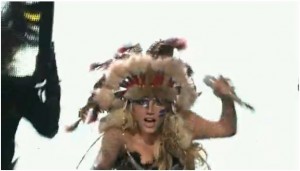Tribalism as Pop Culture Phenomenon and the Perpetuation of Offensive American Indian Stereotypes
By Ruth Hopkins
Non-natives who wear American Indian costumes are pretending to be someone of another race. Just as wearing blackface is repugnant, appearing as a stereotyped caricature of an American Indian is patently offensive. Those who play “dress up” by wearing an American Indian costume, headdress or war bonnet are not only failing to acknowledge the existence of over 500 recognized native nations, each separate and distinct from one another, they are making light of centuries of suffering, oppression and genocide endured by the indigenous people of this country. Enforcing racial stereotypes of Native peoples as savages in nondescript feathers and fringe also perpetuates the myth that American Indians are not active members of modern society and questions our very existence.
Perhaps the most deplorable version of stereotypical American Indian ensembles is the “sexy Indian” costume, a.k.a. the “Pocahottie.” Such costumes, like the one Paris Hilton wore last Halloween, depict Native women as sex objects to be desired by non-native men (and perhaps women). Considering that American Indian women are 2.5 times more likely to be sexually assaulted than any other race of women, that one out of three of all American Indian women are sexually assaulted in their lifetime, and that as many as 4 out of 5 of these acts of sexual violence are committed by non-native men, the very idea of perpetuating the image of Native women as a sex object is reprehensible.
Not all American Indian Tribes include war bonnets or headdresses as part of their traditional regalia. Of those who do, headdresses and war bonnets were worn by men, and have nothing to do with fashion or the sexual objectification of women. Each eagle feather contained in a war bonnet is individually earned, often bestowed upon the owner through ceremony, and represents a significant event or acknowledged act of bravery, leadership, or self-sacrifice. War bonnets are specifically worn by powerful, respected American Indian men with a history of valor who are leaders in their Tribal community. In other words, the only people who should be wearing war bonnets are chiefs or well-respected warriors, like Tatanka Iyotanka, Chief Sitting Bull of the Hunkpapa Lakota—not Khloe Kardashian, or the pop star Ke$ha. Can you imagine the outrage if a celebrity was featured in scantily clad photos with a Medal of Valor or a Silver Star or the Congressional Medal of Honor that they didn’t earn? Such an inconsiderate display would be akin to the wearing of a war bonnet by someone who hasn’t earned it. This disgrace should be included in the Theft of Valor Act.
For recent examples of trendy tribalism, see Natives Attack "Indians" Showband and Callaloo Stereotypes "Native Americas." For more on hipster headdresses, see Hipster Headdress PSA on YouTube and Why Hipster Headdresses Aren't Okay. For more on the problem in general, see Hipster Racism.
Below: Pop star Kesha mocks an entire race.


2 comments:
To an extent, it's not just Indian women who are objectified. I mean, Pocahontas featured not only the ridiculously fanservicey dress, but her fiancé was fanservicey in his own way.
I have to wonder why, exactly, nonwhite women get this idea that warbonnets were women's clothing. From now on, whenever I see a white celebrity wearing a warbonnet, I will say "It's a trap!"
What do you tell an African American; Asian or Latino that wears a headdress? White ignorance is expected, but other minorities, especially Jews that one would think understand racism, also perpetuate this?
Post a Comment